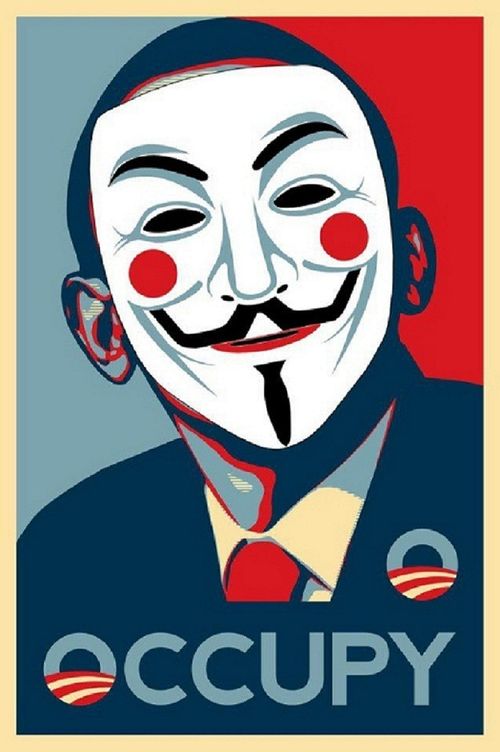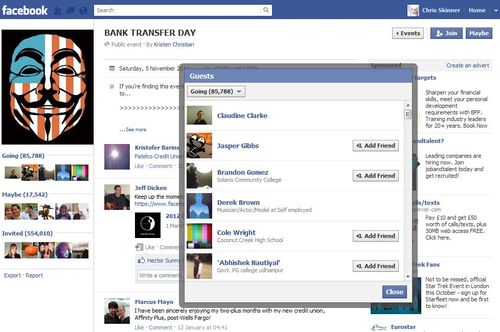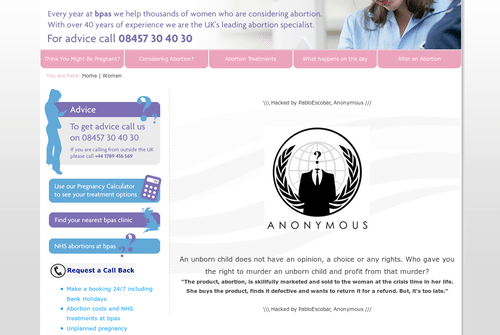
We have seen a great deal of activity from the activist online community called Anonymous in the last year.
They first hit my radar when they closed down the websites of PayPal, Visa and MasterCard in retaliation for the arrest of Julian Assange and closure of Wikileaks funding accounts.
This resulted in a co-ordinated Distributed Denial of Service (DDoS) attack by the Anonymous group, which anyone was able to join if they followed the group on twitter.
They then reappeared on my radar when they successfully hacked the most prestigious American cybersecurity company. They not only hacked them, but it happened to be the cybersecurity company hired by Bank of America to track them down.
Then they got heavily involved in the Occupy movement, and much of the Wall Street and St Paul’s protest had their trademark V for Vendetta masks as part of the protest.

They led the Bank Transfer Day in America last November 5th, and have been mooted around many other discussions, such as those related to bitcoin usage and more.
Finally, we had the big deal of their hacking the ‘private’ conference calls between the FBI and Scotland Yard.
Big deal.
But how long can you stay ‘anonymous’.
Not that long as several members have been ousted in recent times.
This is because their identities are easily traceable if they post stuff all over facebook and twitter.
For example, anonymous post bank transfer day details on facebook and then invited over 600,000 to join in …

… that’s not very anonymous.
The arm of the law is also cracking down on Anonymous, with 25 arrests at the end of February in Argentina, Chile, Colombia and Spain thanks to Interpol's Latin American Working Group of Experts on Information Technology Crime.
And the big news in the UK this week has been the Anonymous group member who hacked into the British Pregnancy Advisory Service (BPAS) and leaked the names of women seeking abortion advice.

Something that isn’t popular with the group at large, and that led to his arrest when he broadcast the whle thing on twitter.
It seems strange that whilst being against abortion on the one hand, the rest of the group is cracking into the Vatican’s accounts, calling the Catholic church "corrupt" and "retrograde".
What all of this demonstrates is that there is a real and present danger from cyberattacks. When amateurs can crack the accounts of the FBI, Scotland Yard, Vatican and more, there’s an issue.
The issue is that the hackers are combining forces with the leakers and that creates a powerful voice of the activist opportunity.
So forget the co-ordinated cyberattacks between governments, such as the regular Israeli-Iranian spats or the idiots at NATO who gave all their personal information to a fake facebook account set up by China, I’m more worried about Anonymous bringing down my bank.
Ah … maybe not.
Anonymous supporters who willingly enlisted their personal computers to launch denial-of-service attacks against the groups' enemies may have unwillingly donated their personal banking information in the process.
Chris M Skinner
Chris Skinner is best known as an independent commentator on the financial markets through his blog, TheFinanser.com, as author of the bestselling book Digital Bank, and Chair of the European networking forum the Financial Services Club. He has been voted one of the most influential people in banking by The Financial Brand (as well as one of the best blogs), a FinTech Titan (Next Bank), one of the Fintech Leaders you need to follow (City AM, Deluxe and Jax Finance), as well as one of the Top 40 most influential people in financial technology by the Wall Street Journal's Financial News. To learn more click here...

